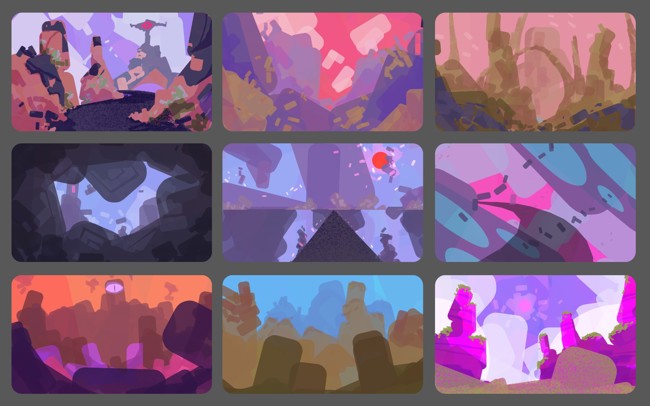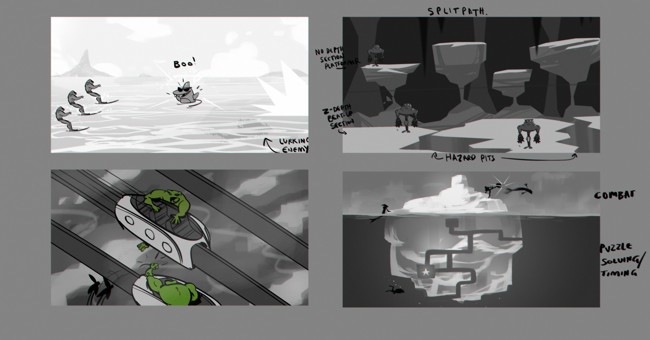Video games are a visually stunning medium, often exploring a wider variety of art styles than any other form of entertainment. But while much of the focus goes on the visual fidelity or striking composition of the final images we see, it's important to remember how those graphics began: as concepts.
Concept artists are crucial to this process, helping to define the look of a game before any of it is even vaguely playable. Rory Jobson, senior concept artist at Essex-based Dlala Studios, says people in this role not only help establish the look of the game world, but also the tone, atmosphere, characters, technology and the stories that game will tell.
How do you define the overall role of a concept artist? What do they do? How do they contribute to a game's development?
"Beautifully rendered and polished illustrations are generally a tiny fraction of the work a concept artist has to do," he explains. "Most of the useful work done never sees the light of day so it can be lost on people studying to enter concept art just how loose and sketchy all the work generally is."

Jobson's career began following "a childhood of drawing constantly." He studied Computer Arts at Dundee's famous Abertay University, trying his hand at various disciplines of game art, including animation, rigging and concept. He chose the latter as his specialization towards the end of the course and developed a keen love for 'The art of...' books that are often released alongside major films and games.
Unsure whether to aim for the animation industry or video games, he ended up taking part in the Dare To Be Digital competition, where teams are given eight weeks to create a game prototype. This really cemented his love for game concept art.
"I ended up doing piles and piles of concept art for this game to the point where it was complete overkill, but it was so useful to have a specific game-world to develop for, and establish what was important specifically about concept art for games and how everything established in the concept art phase is translated into a game-world that players can inhabit and interact with."
He completed his masters in Games Development at Abertay with a full year of additional experience in concept art, as well as preparing briefs for clients such as PlayStation. After graduating, he completed a few unsuccessful art tests as part of job applications while doing freelance work in the evenings. Eventually a freelance opportunity came up to work on a 2D Disney project that really excited him, and this evolved into a role as senior concept artist at Dlala, working on the upcoming Disney Illusion Island.
While Jobson went through university, he emphasises that this is not essential to anyone seeking a career as a concept artist.
"Some of the best concept artists I know did not complete a formal degree and have been very successful," he says. "That said, degrees can be very helpful or even essential when it comes to visa rules.
"Formal university education was extremely useful to me as it gave me this enormous block of time to only worry about developing my skills without having to balance it with a full-time job or other external pressures. There's also so much to be said for being surrounded by a tight group of peers for creative conversation, encouragement and critique, and for exposing you to new ideas and approaches. Admittedly, you can find communities like that online, but to me the formal framework allowed a very useful sustained focus."
Regardless of how you first develop your skills, Jobson emphasises that you need to have a solid grasp of the fundamentals of art: composition, perspective, form and so on. Not understanding perspective, for example, may mean you struggle to land a role as an environment concept artist, while studios seeking character artists will expect a good knowledge of anatomy.
"This is the hardest part of becoming a concept artist," he says. "It takes an incredible amount of hard work to get your skills to the level they need to be to land a role in what is an exceptionally competitive industry. Fortunately, the avenues for learning and exposure to the skills and methods required in these roles have never been more accessible from an online perspective. Online portfolios websites are very easy to find, many artists have extensive teaching materials on their gumroad pages, and that's before even mentioning YouTube."

Concept artists will need more than just art skills. Jobson emphasises the importance of communication, since you will constantly be working with other teams and departments. Also key to this is empathy; you need to understand where your colleagues are coming from, and what they are looking for. Having a basic understanding of game design will help, he adds, as this makes it easier for you to communicate your ideas to designers.
He also emphasises the need for networking skills, as many of the job opportunities you receive or hear about may come through personal connections you made at conferences (either in-person or online) or other, more social industry events.
"Lots of jobs are filled via personal recommendations and word-of-mouth, and so just having genuine relationships with people can result in strange and interesting projects and opportunities presenting themselves to you, which is a really lovely thing," he says.
Finally, he adds that concept artists will benefit from developing some basic business skills, particularly understanding contracts and negotiating pay.
"Lots of early-career artists get low-balled with their salaries because employers know how eager people are to enter this industry," he warns. "When you do get offered your first full-time position or freelance contract in the games industry, reach out to your lecturers, reach out to others you may know in the industry and let them know what you've been offered. If the general response is not positive there's absolutely nothing wrong with attempting to negotiate a better wage.
"It's never a bad thing to ask for more money, especially with education and living costs being as ridiculous as they are now. You might not get more, but at least you then know how much the company values you and if it's truly worth your time."
The day-to-day role for a concept artist can vary from studio to studio. Smaller teams will have a single concept artist that defines everything from environments to character design, while larger, AAA studios will have multiple teams of many concept artists, each of which will specialise in a particular area.
As you might expect, concept artists do most of their work during the pre-production and early stages of game development.
"This is a period of rapid idea generation and rough visual experimentation which fuels the creative conversation around the visual direction of the game and what it ultimately wants to be," Jobson explains. "You get to work out parameters of the project, how weird it can get. You get to work out what fits in your world, and what definitely doesn't – which is extremely useful to know.
"Over time, following a great deal of conversation and feedback with the art director, you solve the visual problems presented by the game design, establish the visual language of the game, and essentially, what everything should look like! In short, you discover the visual soul of the game."
Depending on the studio, as well as the scope and budget of the project, concept artists may be moved over to other parts of development after these stages. Jobson, for example, was assigned cutscene environment art, environment thumbnailing and asset painting after the concept work was complete.
However, he says that some freelance concept artists move from studio to studio, working for a few months on pre-production before moving to another once this is done. Some even wander between different industries and specialisations, shifting towards sectors such as film, illustration, tabletop games and even theme park design.

For those who wish to focus on games, though, Jobson advises that they work hard on putting together a portfolio, which is essential to being hired.
"Employers want to see proof that you can work in the general style that they like to work in, or that the project they're hiring for is in," he says. "And that you understand what specifically will be required of you.
"So make sure you include the little sketches that show of your unique thought process, the sketches where you learned which things worked and which things didn't work, and why they didn't work. A concept artist needs to have ideas – it's in the name – but they also need to be able to develop and hone these ideas in interesting and useful ways that serve the overall vision."
He adds that aspiring concept artists can include fan art in their portfolios, but that it needs to show off your distinct skills. It can be difficult, and requires seeking a fair amount of feedback – ideally from folks in the industry – but you need to develop your own style, find your own voice.
"Consider if it passes the test of 'Have I said something interesting with this piece?' Or 'Have I explored a style that might be relevant to this studio I'm applying to through this fan art in a way that shows off my skills as a concept artist?'."
Jobson also advises that concept artists look outside of video games for inspiration: "If you're currently trying to get your head around a certain kind of emotive lighting, look to theatre to see how a set designer might tackle it. Not satisfied with your costume design for your personal project RPG protagonist? Spend a few hours going through the firstVIEW fashion archives. Get comfortable with stealing little things from all over the place in search of your own voice. I like to remember that behind every genius is 10 people shouting 'Hey, that's my thing'."
Overall, Jobson says that concept artist is a rewarding role to have.
"The best things are the opportunities to work on creatively fulfilling projects with incredible people, meeting your art heroes, and seeing fans celebrate the worlds you help create," he says.
"The worst part is the effect this all has on your posture – so invest in a good chair (literally right now) if you're planning on doing this for a long time."
Barclays (including its employees, Directors and agents) accepts no responsibility and shall have no liability in contract, tort or otherwise to any person in connection with this content or the use of or reliance on any information or data set out in this content unless it expressly agrees otherwise in writing. It does not constitute an offer to sell or buy any security, investment, financial product or service and does not constitute investment, professional, legal or tax advice, or a recommendation with respect to any securities or financial instruments.
The information, statements and opinions contained in this content are of a general nature only and do not take into account your individual circumstances including any laws, policies, procedures or practices you, or your employer or businesses may have or be subject to. Although the statements of fact on this page have been obtained from and are based upon sources that Barclays believes to be reliable, Barclays does not guarantee their accuracy or completeness.
